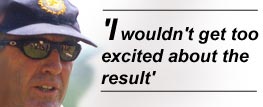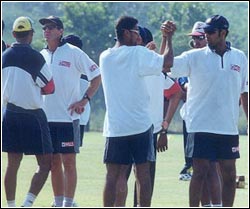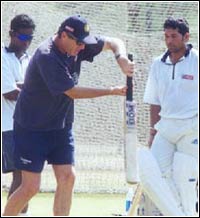The Rediff Interview/ John Geoffrey Wright

'Let me finish with the Aussies first,' he told me a month ago, a slight grin breaking the seriousness of his wrinkled face, when I asked him for an interview. 'I'd rather talk after I have done something, not before.'
A month later, we have an astounding series win against the Aussies to our name -- and John Geoffrey Wright, coach of the Indian cricket team, is still reluctant to step into the spotlight.
In Kolkatta, the players asked their coach to join them in the victory lap. Wright refused, preferring to remain within the confines of the dressing room. That, in one incident, sums up the man -- Wright prefers the shadows to the sunlight, prefers to do his work quietly and without fuss, and leave the limelight to others.
Much has been made of the impact Harbhajan Singh's bowling, and VVS Laxman's batting, has had on the Indian team's seemingly miraculous turnaround. Strangely, however, no mention has been made of the influence of the 'foreign hand' -- probably because that hand does it work in relative obscurity.
 Wright, thus, remains the unsung hero of the team. Some of the players refer to him as 'a gypsy with a guitar', while other say he is tough as nails. Not one, though, has a hard word to say for him -- in marked contrast to their feelings about previous coaches in our recent cricketing past.
Wright, thus, remains the unsung hero of the team. Some of the players refer to him as 'a gypsy with a guitar', while other say he is tough as nails. Not one, though, has a hard word to say for him -- in marked contrast to their feelings about previous coaches in our recent cricketing past.
John Wright discusses with Faisal Shariff the team he coaches, its strengths and shortcomings, and the vision he wants the players to have. Excerpts:
You have during your playing days had a wonderful record against India -- has that helped in any way in your work as coach of this team?
I don't think so, not specifically. I have a number of Indian friends in New Zealand, and I always enjoyed playing against the Indian teams. They were always a great bunch of guys to play against, skillful cricketers and good people. The boys that I work with now are a tremendous group.
As a Kiwi, I knew what it was to go into a series against Australia as the underdogs, and even though they hadn't beaten us here, I think it is fair to say that we started as the underdogs. And I think that may have helped.
As a batsman, you showed a distinct fancy for the Indian attack. What was the secret to your success against our bowlers?
I was a very traditional player. I was too defensive against India, actually, and I got my first Test century after I had been struggling for a while. And mainly I got it on turning wickets, though I was a better player against the quicks. You have to remember that I did best against India in 1989-'90, when I was playing my best cricket. And at that time the Indian team didn't have four pace bowlers like the West Indies (*laughs*).
Vision is a word we hear used quite a lot these days -- so what is your vision for this team?
I don't have a vision, it is not for me, but for the players, to have a vision. That is the most important thing -- it is they who have to decide what they want to do and achieve, and where they want to go. Once they have a vision and spell it out, it is my job to help them achieve it, if I can. We want to become better cricketers, and that means working at our basic skills and disciplines. It means a lot of hard work, really.
When did you decide that you wanted to become a coach?
I was working in business, and my last job was national sales manager for a company, I worked on the sales and distribution side. Someone rang me up out of the blue, from Kent, and asked, "Our coach is not coming back, would you be interested?"
I didn't exactly love business, I didn't love having a real job. I had been a professional cricketer till I was 38 and then I had spent 4-5 years in business and it wasn't half as much fun as being in cricket. I always thought that coaching was fun, I always loved reading coaching books, and I had done some coaching in New Zealand.
I had also been national captain, if you remember. Captaincy is a lot about coaching. A coach and a captain are very similar, except that the coach has a different role; he can't play the game, he can only set the environment off the field.
 But it is the job of both coach and captain job to get the best out of your players. And I always felt that it is one of the challenges of the job, that it is a different relationship being coach than being captain. You can be a bit more detached, a little bit more objective.
But it is the job of both coach and captain job to get the best out of your players. And I always felt that it is one of the challenges of the job, that it is a different relationship being coach than being captain. You can be a bit more detached, a little bit more objective.
'Geez, what on earth was that?!!!!!!', he exclaims, watching Sachin Tendulkar go berserk in the charity game against the Aussies, which was going on at the MA Chidambaram Stadium even as we spoke
How different has it been, coaching Kent and coaching the Indian team?
The players here are a lot more talented and they are prepared to work harder. They don't see it as a job, as some English players see it; and its much more exciting because the stakes are bigger and the crowds are bigger and the passion for cricket is just wonderful. The crowds are huge, the feel for cricket and cricketers here is very special. Of course, it is not much fun when things are going badly, but for me, it doesn't change the way you do your job. You just try and do a good job and hope that results come your way.
How would you define your job? As coach, what are the areas you work on?
I think there are two levels. One is the individual level, where you've got to be the friend, the helper, the taskmaster and sometimes the disciplinarian; a mixture of all these things. So that's a bit of a teaching role; I taught at high school when I was young, and that helps.
The other thing is to get the culture of the team right, set the standards that you want, and focus on your goals from a team's perspective and an individual's perspective,
It is very difficult to define really, but you have got to do it your way, you have to be honest in what you do. I am pretty old-fashioned and I think picking the right people is very important.
I am more interested in players who want to work, than in their ability. I am more interested in effort than ability. Ability is important, but if you don't have effort, then forget it.
That is what I'm always telling the selectors. Some players look really flashy and get easy runs or easy wickets, but the ones who really work are the ones who play in tough situations and win you games; and that is special. When you get both ability and hunger to handle pressure then you can really have a great side.
Look at Dighe's innings here, he was having a tough match with the gloves but you must realise that it wasn't entirely his fault. It was a bad throw to run out Hayden, it should have been in front of the stumps, he could have taken it then. The stumping chance against Mark Waugh was a slight nick and the ball hardly rose a couple of inches above the ground, it was a very tough chance and he got stick for that, and for some other things as well. He also copped a tough decision when batting in the first innings. And then he comes out and when we really need someone to be really tough and stand up and say that I will get India up, this guy delivers in only his first Test.
You can't coach someone to get that attitude; I was really impressed with that. That is the thing that you really need. You get enough of that, and you will start making things happen.
What in your view does this team lack, what does it need to better itself?
We need consistent opening partnerships, which we aren't getting, particularly overseas when the ball moves around. Our fielding is still very very ordinary. We are starting to get people in specialized positions, which made a difference in this game. Our running between wickets is ordinary; we're not busy enough as cricketers, we don't rotate the strike enough and we have got to be more disciplined in our lines.
That was the one thing about Harbhajan that I was really impressed with. The reason why he succeeded was that he bowled a disciplined line and stuck to it. He never went away from it, and because he got the confidence to do that he developed the arm ball. No one coached him on that ball, he was confident and he got it on his own. Instead of starting too many theories, if we just stick to the basic discipline and skills it will help. It was good to play Australia because off the field it was a great example for us to watch; it was nice to compete with them, to beat them was a bonus.
How much of a difference do you think the camp in Chennai made?
I don't know, but the guys surely looked tired. I think it did well for me. It sent the message across to the players about the kind of work ethic I was looking at. So now they will be better prepared for the next one, which will be even tougher. The boys now know that coming to a camp is not a holiday.
What is the real John Wright all about?
I have no idea; you have to ask other people what I am about. I have a fair idea what I am about and like I said, sometimes you got to be kind and sometimes you got to be hard. It's about dealing with people and getting the relationships going.
What has the victory against Australia really meant, to this side?
It has given us a little bit of confidence, which is important. It has given us self-belief. But I wouldn't get too excited about it. We should have won a lot easier here. The victory in Calcutta was a good victory, because we really fought hard. Here we fought hard, but we also made it so much harder for ourselves. That is something we have to learn to avoid.
Interviews
Mail Cricket Editor